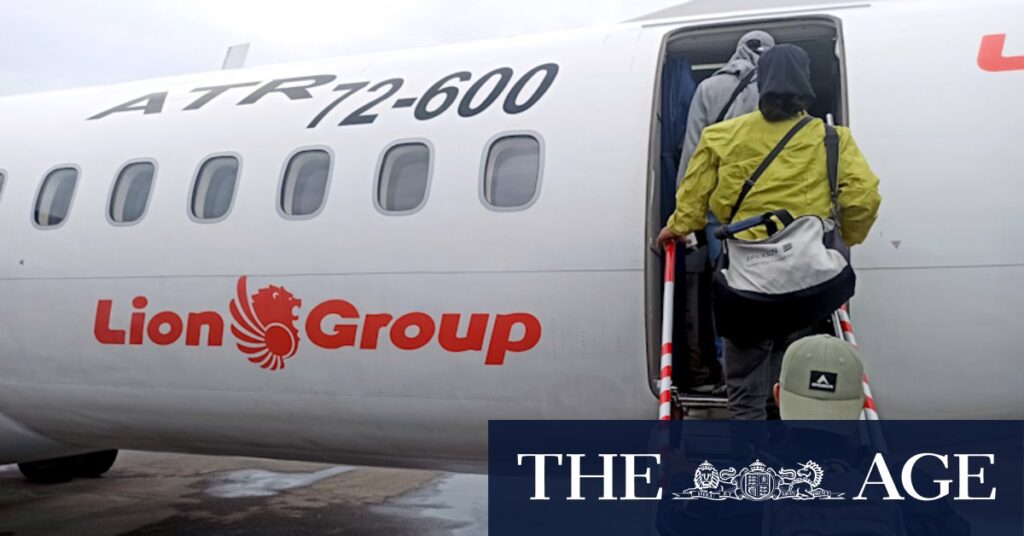
Flying can be a stressful experience for many, but when boarding a flight with a one-star safety rating, even seasoned travelers might find themselves on edge. This was precisely the scenario for passengers on Wings Air flight IW1835, departing from Tambolaka Airport on Sumba Island to Denpasar, Bali. The flight, scheduled for 3:25 PM, is operated by an ATR 72-500 twin-engine turboprop aircraft and is notorious for its less-than-stellar safety reputation.
The airline, a subsidiary of the Indonesian budget carrier Lion Air, has consistently received a one-star safety rating from AirlineRatings.com. This has not only made it a topic of concern among travelers but also a running joke among expats in Bali, who often quip about the airline’s safety record.
Boarding Experience: A Study in Minimalism
Upon arrival at Tambolaka Airport, the check-in process was surprisingly minimal. Passengers were handed their boarding passes and whisked through security with little fanfare. Luggage handling was equally straightforward, albeit with a sense of unease as belongings were left in the hands of the airline staff without much oversight.
Tickets for Wings Air flights are typically booked through tiket.com, with options for carry-on and checked baggage. The standard ticket includes 7 kilograms of carry-on, while additional cabin baggage incurs extra charges. For a three-week trip, one passenger paid $48 for 20 kilograms of checked luggage.
In-Flight Conditions: Sparse Comforts and Heightened Anxiety
The ATR 72-500 aircraft features 72 seats in a 2-2 layout, with limited legroom and minimal seat recline. The flight from Sumba Island to Bali, which should take approximately one hour and 40 minutes, departed 23 minutes late. Passengers were left to entertain themselves with personal devices, as the aircraft offered no in-flight entertainment or refreshments.
The cabin crew, though friendly and professional, were not frequently seen throughout the flight. Their presence did help to alleviate some passenger anxiety, which was heightened by the airline’s safety reputation and the lack of amenities.
Safety Concerns and Public Perception
Wings Air’s safety rating is a significant concern for travelers. The airline’s reputation is such that even a minor turbulence can cause panic among passengers. Anecdotes from previous flights, including one where a loud bang during descent led a luxury hotel executive to question the aircraft’s integrity, underscore the pervasive anxiety surrounding the airline.
“Is the engine still there?” asked a visibly frightened passenger during a turbulent descent.
Looking Ahead: Sustainability and Future Prospects
Despite its current challenges, Lion Air, the parent company of Wings Air, is taking steps towards sustainability. The airline plans to incorporate sustainable aviation fuel (SAF) across its fleet by 2030 and has already implemented non-cash payment methods as part of its environmentally friendly initiatives.
However, the airline’s safety record remains a critical issue that needs addressing to restore passenger confidence. As the aviation industry continues to evolve, Wings Air’s ability to improve its safety standards will be pivotal in determining its future success.
Conclusion: A Flight to Remember
For those who brave the journey with Wings Air, the experience is often one of heightened awareness and relief upon landing. While the flight itself may be uneventful, the underlying tension due to the airline’s safety reputation is palpable. As one traveler noted, the flight felt significantly longer than its competitor on the same route, NAM Air, which completes the journey in just 50 minutes.
Ultimately, the decision to fly with Wings Air is a personal one, weighed against the convenience of its routes and the anxiety of its safety record. As the airline works towards improving its operations and sustainability efforts, passengers can only hope for a safer and more comfortable flying experience in the future.







